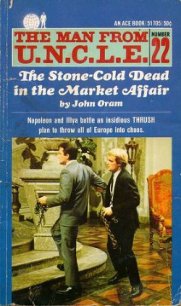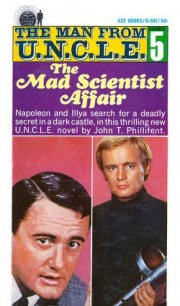The Copenhagen Affair - Oram John (лучшие бесплатные книги .txt) 📗
He studied the bubbles thoughtfully. Then he went on, “I figure we have at least until sunset. They won’t take that thing out in daylight.” He looked at the others. “Incidentally, how do you suppose they get it out of the workshop?”
Viggo said, “That, I think I can explain. In your country I believe you keep the big missiles in deep silos. The sliding roof is camouflaged to look like the rest of the land. When the Germans were here, they hid and launched their rockets so. And these people are using the old workshops, much enlarged. No doubt the saucer goes out through the top of the hill.”
Solo nodded. “You’re probably right. How many men did you see in the place?”
Illya said, “Apart from Garbridge and the fellow with him, there was the tractor driver and the gang of six waiting to unload the bombs. Two others were working around the generator. That makes eleven. There may have been others inside the saucer.”
“I wonder who the man was with Garbridge,” Karen said.
“That was undoubtedly Sonder,” Viggo replied. “Both Knud and I recognized him immediately.”
Solo finished his drink and took out the black transmitter. “I think it’s time to get reinforcements,” he announced. He turned the dial and called, “Come in, Paramount.”
Gutte’s voice answered perkily: “Glaedelig Jul, Napoleon.”
“And a good New Year to you,” he grinned. “Now, if you’ve finished with the pleasantries, see if you can get Mr. Jorgensen to rustle up a few pounds of marzipan with pencils, a crate of pineapples and a jar of London fog.”
“Can do. How soon, and where?”
“In an hour, if you can. Hang on.” He turned to Viggo. “Who do you know near Silkeborg who can be trusted?”
Viggo said, “One of the old group has a farm just outside. He’s safe.”
“Good!” Solo spoke again into the transmitter. “Gutte, put the stuff into a jet and have it dropped. I’m putting somebody on to you now to give you the bearings.” He handed the little black instrument to the farmer.
There was a rapid exchange in Danish; then Viggo told Solo, “The stuff will be dropped within the hour. I’ll go now to collect it. Don’t worry about my friend. He does not talk.”
He put on his sheepskin coat, waved a hand and went out. A few seconds later they heard a car engine start up.
Karen said, “Marzipan, pencils, pineapples and London fog. The plastic explosive, fuses and grenades I can understand. But why the ‘fog’?”
Solo poured another Ceres, held up the glass and pointed to the dancing bubbles.
“When your house is infested with rats,” he said, “what’s the quickest way of getting rid of them?”
The clock in the living room was striking four when they heard the sound of the car returning. Viggo stamped in, giving the thumbs-up sign.
“No trouble?” Solo asked.
“Nothing. The drop was perfect—right on target. And the roads are clear. I met nobody.”
“Good! Then let’s get down to cases. The main problem is to put the factory out of business for keeps and, if possible, capture the saucer intact. If we can get. Sonder and Garbridge alive, so much the better. But whatever happens they mustn’t get away—particularly the gallant major. What happens to the proletariat doesn’t matter. They’re not important. Understood?”
They nodded.
“Fine! Then here’s the plan. I’ll go into the tunnel with the ‘fog’. You, Illya, will go with Viggo, Knud and Karen in the truck. Park it out of sight somewhere at a safe distance and leave Karen with it as general watchdog. Then the rest of you make your way to the mine entrance and set your charges along the fence and at the blockhouse.”
He looked at his wristwatch. “I should be able to get to the workshop end of the tunnel by six o’clock. I’ll open the shutter and start spraying at exactly six-oh-five. Set your fuses to detonate at the same time. Then go in and start the rat hunt. Clear?”
“Like crystal,” Viggo said. He chuckled. “I shall enjoy the feel of plastique in my hands again. It will be like the old days.”
Karen said, “You are a bloodthirsty old ruffian, Herr Jacobsen. It must be the beard.”
Illya and Sorensen went out to the car and returned with two heavy cases. Illya grumbled, “Gutte’s sent enough grenades for an army corps. She must think we’re going up against the Viet Cong.”
Viggo produced haversacks from a cupboard and they began to stow the supplies with infinite care. Solo took from one of the cases a long, slim metal canister fitted with a short length of rubber hose that ended in a nozzle. It looked like a streamlined fire extinguisher. He attached a body harness and strapped it on his back. When the packing had been completed and the haversacks distributed, he said, “Synchronize your watches. Our timing is going to be vital.”
Viggo could not resist a last touch of the dramatic. He brought out a bottle of akvavit, poured small glasses of the colorless, potent spirit, and handed them round.
“To the destruction of our enemies!” he intoned.
“But be very sure there are no slip-ups,” Illya said mordantly.
They went out into the darkness.
Solo stood in the doorway, watching them load into the truck and drive off. Then he closed the door and made his way toward the cow barn.
His progress along the tunnel was more difficult this time. The canister on his back was heavy and cumbersome, and he had to move with extreme caution to avoid the clink of metal on stone. But at last he reached the rock face. The whine of the generator had stopped, but that was a mixed blessing. It meant that the slightest sound might be heard in the workshop on the other side of the barrier.
Solo looked at the luminous dial of his watch. The hands showed 5:55. Very slowly and carefully he unstrapped the body harness and lowered the cylinder to the ground in front of him. Then he switched on his pencil flashlight and made sure of the position of the panel.
He looked at his watch again. 5:57.
The truck, with exhaust muffled and no lights showing, trundled down the road. Sorensen, crouched over the steering wheel, suddenly gave a grunt of satisfaction and swung off the pavement on to the grass verge. The truck jolted along over frozen hillocks and came to rest in the shelter of a clump of trees and high bushes. Knud sighed and sat back.
“So far, so good,” he said. “We should be safe here. It is about one kilometer to the gates of the mine. From here we must walk.”
He climbed down from his seat, slung two haversacks over his shoulder and tucked his scattergun into the crook of his arm. The others joined him and he said, “I think, now, that Viggo should lead the way, since this is his territory. Do you agree, Illya?”
“Fine,” Illya said. “Karen, you stay here on guard. You have your gun and your transmitter?”
“Of course.”
“Then good luck.”
They moved off in Indian file, Viggo leading and Sorensen bringing up the rear. As they walked they smeared blacking over their faces. After only a few paces Karen could no longer see or hear them. She huddled against the lee side of the truck, wishing miserably that the cutting Arctic wind would abate. She thought with longing of the bottle of akvavit on Viggo’s table. A snort or two, she felt, would have kept her warm and relieved the monotony of waiting.
The men kept to the cover of the undergrowth along the side of the road. There was no moon and they dared not risk using a flashlight, but the hard ground made the going fairly easy.
Eventually Viggo stopped and pointed to a light gleaming yellow some two hundred yards away on the far side of the road.
“The blockhouse,” he whispered.
They moved on again silently. The light grew bigger, more distinct. They could see that it came from the one high window in the building. There was no sign of movement anywhere along the road.
They went a few more paces. Then Viggo suddenly froze. “Look!”



![[Magazine 1966-12] - The Goliath Affair - Jakes John (библиотека электронных книг TXT) 📗](/uploads/posts/books/56867/56867.jpg)
